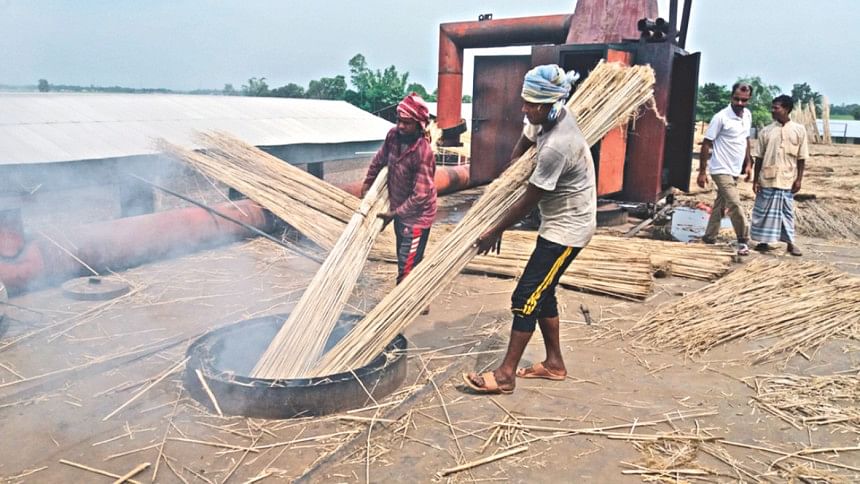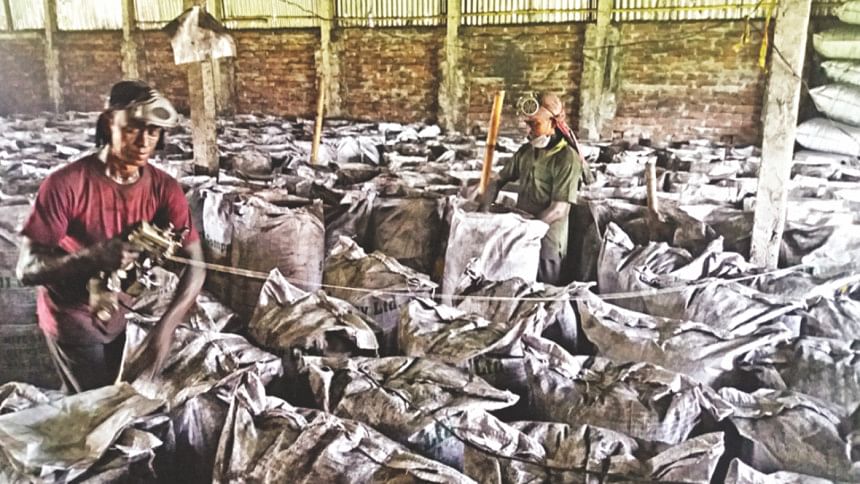Time for jute stick too to earn forex

You may well have seen this many times before: long, thin jute sticks being dried under the open by the roadside or at a village yard. Usually, they end up as fuel for earthen stoves or as fences for betel leaf plantations.
You may not know that ashes of jute sticks could have any other use apart from cleaning kitchen utensils. The ashes can fetch a fortune.
Two Pabna jute stick processing factories have in recent times earned a good amount of foreign currency by exporting ashes of jute sticks, known as patkhari.
This particular type of ashes is produced from burning dried jute sticks at a certain temperature in special furnaces. Later, they are crushed to powder. The powder is called “jute stick carbon”, as it contains carbon.
“China is a big market for our jute stick charcoal dust powder,” said Waheduzzaman, manager of SJJ Company Ltd in Pabna. “Korea, Japan, Taiwan and other countries also have demand for the ashes, as those are used for making dry cell batteries, cosmetics, carbon paper, computer ink and various chemical products.”
The China-Bangladesh joint venture company started exporting the charcoal powder to China this year. The other company in the district is in Bera upazila.
There are 25 such factories, including the two in Pabna, in the country, according to officials of SJJ Company.
The country exported jute stick carbon to China and earned Tk 140 million during the fiscal year 2015-16, according to industry insiders.
Countries like Japan, Turkey, the United States, Australia, Taiwan, Canada and Mexico have demand for charcoal powder.
The powder is used for making various products like cosmetics, dried ink of photocopier machine, dry cell batteries, water filtering and other chemical products.
Raw jute -- touted as the golden fibre -- and jute products are well-known foreign currency-earning items of the country. The charcoal powder from jute sticks are a new addition.
Established in 2014 at Norjan village in Pabna's Atghoria upazila, SJJ Company Ltd went into production in May this year, said Wahed.
“We are producing three to four tonnes of carbon from burning 20 tonnes of jute sticks twice a week,” he said.
Wahed said the company exported 110 tonnes of powder to China in the last four months and earned $1,00,000. Each tonne was exported for $800 to $1,000.
The production of charcoal powder increased due to the rising demand for the item in the international market, he added.
There are 14 specially-made furnaces in the factory.
“The sticks are burnt for 10 to 12 hours in the furnaces,” said Joynal Abedin, supervisor of the factory. “The lids of the furnaces are then closed so that no oxygen can enter there. The ashes are kept there like that for four days. Then we collect those, crush them and sent for packaging.”

“The packages are sent to Chittagong Port from where those are shipped to China,” he said, adding that the company was trying to export ashes to other countries as well.
He said they collect jute sticks from farmers in Pabna and adjoining areas. Each tonne of sticks cost them Tk 4,000 to 5,000.
“But we don't get sufficient materials from local areas. At least 1,800 to 2,000 tonnes are needed to run the factory round the year. We have collected only half the amount so far,” he claimed.
The new concept was gaining popularity among the farmers and entrepreneurs in the district. Farmers are now interested in growing jute more, as they eye for more benefits from jute.
“We suffered losses from jute cultivation in the last few years as the prices were not good. This year, we are getting a good price for the fibre. Moreover, we can earn Tk 10,000 to 15,000 extra from the jute sticks,” said a farmer.
“Just a year ago, we used jute sticks for cooking or for making fences. But now we can sell them and earn some extra money,” said Ukiluddin, a local of Norjan village.
Considering the huge export opportunity, many entrepreneurs in the district expressed their interest in starting this business, Mahabubul Alam Mukul, senior vice-president of Pabna Chamber of Commerce and Industries, told The Daily Star.
The two jute stick processing factories in the district exported 50 to 60 tonnes of ashes and earned around $50,000 in the last four months, he said.
Another factory was being built in the district and it would probably start production next year, Mukul said.
He, however, said the government should provide financial support, like extending loans and giving incentives, to entrepreneurs to help expand the sector.
According to the Department of Jute, nearly 30 lakh tonnes of jute sticks are produced in the country every year and a large portion of them are used as firewood and for making fences in rural areas.
If half of the total produce could be used for making ashes, it is possible to earn $30,00,000 to $35,00,000 annually from their export, officials said.

 For all latest news, follow The Daily Star's Google News channel.
For all latest news, follow The Daily Star's Google News channel. 



Comments